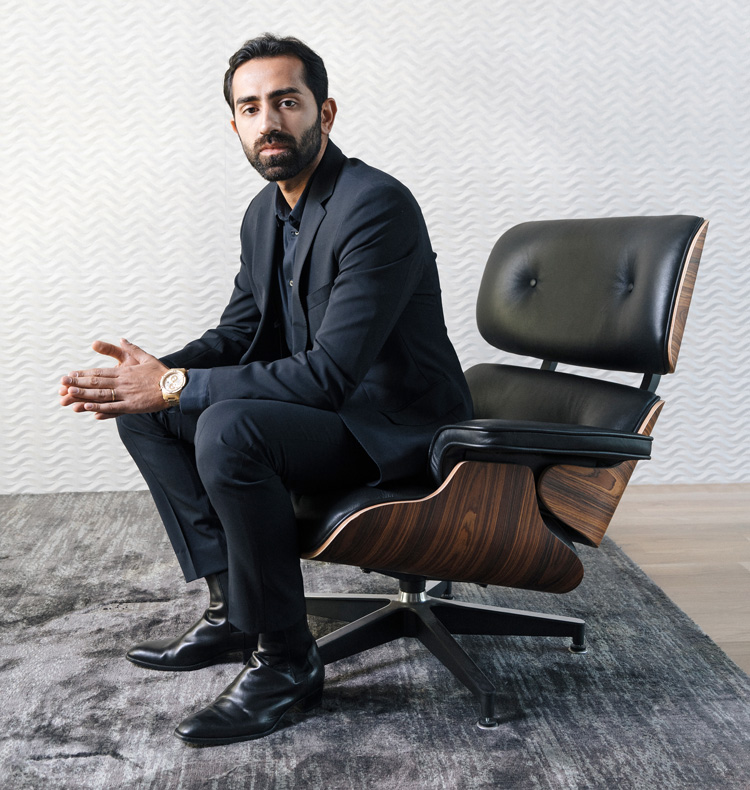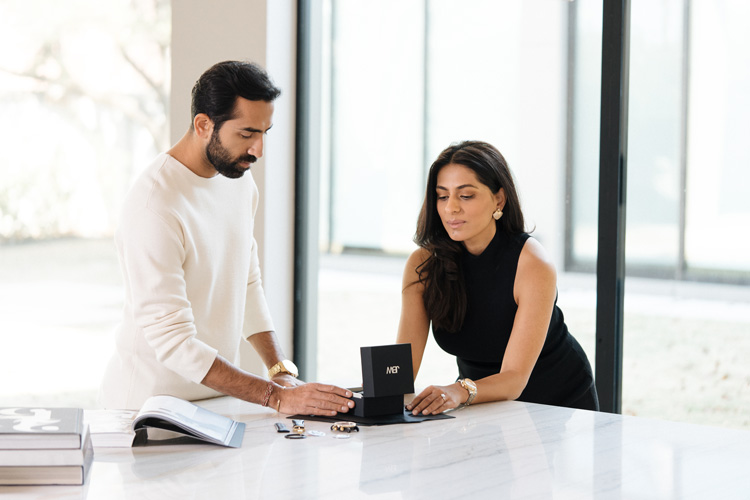
AMIR MEGHANI, FOUNDER & CEO, JBW, HAS A MODERN TAKE ON THE EVOLUTION OF WATCHMAKING.
It all happened by chance, when Amir Meghani was 22 years old and working at his father’s watch shop in a wholesale district of Dallas. At that time, they were a family of traders, who had been buying and selling fashion and designer watch brands for three generations. However, this changed during Meghani’s first year of working in the family business, when he told his father that they would not sell other people’s brands forever.
With no background in branding, manufacturing, or design, it was Meghani’s mentality and vision that defined JBW to be different, bold, and unafraid. After noticing a gap in the market, his sheer determination led him to attend every rap concert in the city, finding his way backstage and gifting artists with JBW watches and snapping photos. He made friends with the radio personalities of Dallas, and anyone that could connect him to a famous musician or athlete, working with a marketing budget which was only his time and cost of manufacturing the watches.
Fast forward nine years and Meghani now has an experienced design team in house, a full product line, distribution channels and a true understanding of his brand and customer. He says while it is always evolving, the team is constantly on the pulse of the customers desires and needs when it comes to accessorising their personal style with a watch.
Tell us the story behind the conception of JBW?
I was working in my father’s wholesale watch shop, where we were selling fashion and Japanese watch brands to the market in Dallas, Texas, and one day during the 2000s, the official era of bling, a local rapper and his manager came into our shop looking for a diamond watch to wear in his new music video. With no experience in product design, branding, or watch manufacturing, I promised them that there would be diamond watches in our shop soon. I did research online, understanding that the leading diamond watch brand of the time was Jacob & Co, and after searching all the brands I settled on ordering a few watches from a small New York based brand. I shared them with a watch manufacturer in Asia and 6 months later I had a diamond watch brand, which I named Just Bling Watch. There was not a lot of thought put into what I was doing, I was only 22 years old. I studied Economics at NYU, and I had no design or marketing background. It was the hustle inside of me that came across an opportunity, and I jumped on it.
What is the brand DNA?
Today we are an entry-level luxury diamond watch brand. At the core we are out to make a bold statement in everything we do, and it starts with our unique watch designs. We want to empower our customers to create their own success, and show it! We provide them with a watch that serves as a symbol of that success. We have boundless confidence and are constantly striving for a higher-class status and hope to inspire our customers to do the same.

What was the catalyst behind creating your own label, especially in an already saturated market?
It happened by chance, I did not think about the competitors or the challenges that would come. I wanted something that could be mine, and leave the market of selling other people’s brands. This was the history of my family in the watch business, for two generations my father and grandfather were traders, buying and selling watches.
Do you feel that the growth of the brand was thanks to the glamour of the early 2000’s?
Absolutely, it was the essence of our product and fed into the DNA of JBW.
Why did you choose to focus on celebrities when marketing JBW, and tell us how you achieved this with an unknown brand?
I was a fearless 22-year-old without a marketing background, and it was what I saw other brands doing at that time. It was also the cheapest form of marketing, all I had to do was hustle and talk my way into the right situations. Finding myself backstage at concerts, radio stations, celebrity golf tournaments, and charity events with athletes. It was watches, a photographer and me.
How would you say your brand has grown and matured since you launched in 2008?
We now have an in-house design, sales, marketing, and after-sales service team. We’ve grown from 3 people to 18. The most important part of our maturity was shifting to innovating and creating in-house designs, which happened 4 years into the brand. It has given us more confidence to approach retailers and consumers with a unique and branded offering.
What do you feel is key to the growth of the brand, and has been key so far in the journey of the brand?
Discovering our point of difference and focusing on improving it year after year. Throughout the journey of building JBW, we tried lots of different sales channels, designs, and marketing campaigns. Once we were able to realise what we stood for, and what made us different, we subtly screamed it loud to our customers. This was a turning point for us.
Can you share with us the biggest challenges you’ve faced and lessons you’ve learned while growing your brand?
The biggest challenge was finding our identity. The sooner you can figure this out, own it and focus on what makes you different, you will succeed.
What’s the secret to a successful label?
Staying true to who you are whilst remaining fresh and relevant.
What has been the most significant breakthrough moment in your career?
I don’t think I have reached it yet.
How did you learn about the business side of the company, and do you think that this is just as important as the designs you produce?
I learnt about this first, understanding how the business worked before the creations came to life. I guess it’s different for everyone, and possibly I did it in the opposite way to others.

How does technology play a role in the way you’re building your retail empire?
The tools available to independent brands today are very advanced. We are able to gather data about our customers and market trends easily and efficiently. It informs the decisions we make, for example, focusing on the Middle East market. The traffic of visits, sales, and social media communication we have from this region has played a major role in the decision to grow our partnerships in the region.
What are your views on the rise of social media, do you think it is advantageous to the world of watchmaking?
Yes, it’s amazing to communicate with customers so personally. To be able to share a brand’s story, process, and show customers what makes their watches special.
How do you feel social media and digital is shaping the industry?
It’s challenging brands to be more creative in their communication, and pivot marketing strategies to appeal to a new generation of watch consumers. Although it’s challenging to brands that have been around before the rise of social media, we will be thankful for these communication tools as the digital industry continues to mature.
Tell us how you have used social media to JBW’s advantage?
I will admit, we first struggled on social media. We were not able to react quick enough to the rise of this channel. However, in the past year we have figured out how it can work for us. One of our greatest assets is the uniqueness of our product. It is the hero of our social media communications, and so far, this strategy is being received well by our customers.
You are a worldwide brand, how do tastes and demands alter around the world?
The Middle East is our fastest growing market. We are learning the tastes of the consumer here and altering our products to better suit them. These include exclusive limited editions, timepieces with more diamonds and embellishments, compact case sizes, green faced dials, and more. We are meeting the demands of the market to the best of our ability, while remaining true to our design aesthetics.
What key styles are most in demand in Dubai?
For men it is the G4, Delano, and Phantom, and for women it is the Mondrian, and Victory.
Do you create exclusive pieces for the region?
Yes, a limited-edition execution of our Jet Setter collection, with 5.50 carats of diamonds on the bezel and bracelet was introduced in 2017. We made only 10 pieces for the region, which were sold out in the first week.
Tell us about your input into the design of each watch?
Design is a collaborative process for our team, with sales and marketing also providing their input. Our designers lead the way, but I am very involved throughout the whole product life cycle. I have a vision for where the collections are heading.
How do you ensure you are competing at the same level as other heritage brands in the market?
To be honest, we don’t worry too much about others now. In our entry-level luxury segment, we are one of the few diamond watch brands. We are focused in our lane and constantly striving to provide our customer with a world-class product and service.
Tell us about how you are introducing more complications to your timepieces?
Our full line is currently quartz, and in 2019 we plan to introduce our first automatic timepiece. It will be a milestone for JBW, and we are very excited for the introduction of this collection.
How would you describe your personal style?
Considered and tasteful.

What was the first watch you remember wearing?
A Casio calculator watch that I got from my dad’s shop.
What are you wearing on your wrist now?
The JBW Strider in yellow gold.
Can you share with us what you enjoy most about owning your own company?
We are a family business, I am fortunate to spend time doing what I love with my family.
What keeps you motivated and inspired?
Our team, we set goals together and want to succeed as a group. Sometimes this keeps me up at night, as they are a very talented team and I want to provide all of them the opportunity to grow and succeed.
What previous experience ensured you were well equipped for running your own business?
Since it was my first work out of university, maybe it was the few summers and Saturdays I spent sitting at my dad’s shop watching him sell.
What advice would you give to others who are trying to build their own business?
Find your identity and what makes you different. Stay laser focused on that, and do it consistently for years. Do not expect to be an overnight success, as that is rare, and is known by some as a unicorn!
Do you hope the family tradition of your brand continues through further generations?
Yes, that is my greatest ambition for our brand. It must live on past us, as it was difficult for my father and grandfather to do it. It’s only right that my sister and I try to accomplish this.
What can we expect next from JBW?
More exclusive collections for the Middle East.
Available online at JBW.COM
READ MORE
You Can Now Stay In A Hublot Suite
Sheikh Mohammed’s Specially-Commissioned Rolex Goes To Auction















